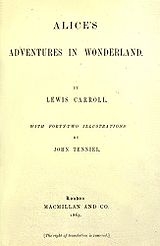
written by English author Charles Lutwidge Dodgson under the pseudonym
Lewis Carroll
. It tells of a girl named Alice
who falls down a rabbit hole into a fantasy world
(Wonderland
) populated by peculiar, anthropomorphic
creatures. The tale plays with logic
, giving the story lasting popularity with adults as well as children. It is considered to be one of the best examples of the literary nonsense
genre, and its narrative
course and structure have been enormously influential, especially in the fantasy
genre.
Chapter 1 – Down the Rabbit Hole: Alice
is feeling bored while sitting on the riverbank with her sister, when she notices a talking, clothed White Rabbit
with a pocket watch run past.
All in the golden afternoon Full leisurely we glide; For both our oars, with little skill, By little arms are plied, While little hands make vain pretense Our wanderings to guide.![]()
Thus grew the tale of Wonderland: Thus slowly, one by one, Its quaint events were hammered out — And now our tale is done And home we steer, a merry crew, Beneath the setting sun.![]()
Alice! a childish story take, And with a gentle hand Lay it where Childhood's dreams are twined In Memory's mystic band, Like pilgrim's withered wreath of flowers Plucked in a far-off land.![]()
Alice was beginning to get very tired of sitting by her sister on the bank, and having nothing to do: once or twice she had peeped into the book her sister was reading, but it had no pictures or conversations in it, 'and what is the use of a book,' thought Alice, 'without pictures or conversations?' ![]()
There was nothing so very remarkable in that; nor did Alice think it so very much out of the ordinary to hear the Rabbit say to itself 'Oh dear! Oh dear! I shall be too late!' ...but when the Rabbit actually took a watch out its waistcoat pocket, and looked at it, and then hurried on, Alice startled to her feet.
![]()
After a fall such as this, I shall think nothing of tumbling downstairs!![]()
If you drink much from a bottle marked 'poison' it is almost certain to disagree with you, sooner or later.![]()
Well, if I eat it, and if it makes me grow larger, I can reach the key; and if makes me grow smaller, I can creep under the door: so either way I'll get into the garden, and I don't care which happens!![]()
Curiouser and curiouser!![]()

